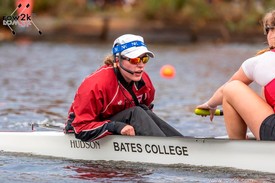Time Management Part 1 - Time Management Coaching

Following the cancellation of the 2020 spring racing season, row2k solicited the collegiate coaching community to engage in a variety of high-level topics within the profession. We submitted over sixty questions across a dozen topics and thank the coaches and staffs that found time to contribute their thoughts during this stressful time.
This week we focus on the topic of Time Management with the following question:
STUDENT ATHLETES HAVE HIGH DEMANDS ON THEIR TIME, HOW MUCH TIME MANAGEMENT COACHING HAVE YOU FOUND NECESSARY?
CLAIRE MARTIN-DOYLE – MIT LIGHTWEIGHT WOMEN
A fair amount in the beginning of their college career; with first years, a weekly check-in meeting is standard, and time-management is a big part of that discussion. As they continue in their college years, less coaching is needed, but we do have systems in place to keep track of how each athlete is managing throughout her career.
BRIAN PERKINS – TEMPLE MEN
Rowers do a lot at odd times of the day for little to no material reward. Therefore, we do a large amount of time management coaching. "Clock Time" or "Calendar Time" are constant: an hour is an hour is an hour, but the perception of time is very different. Older coaches see each season go by in the blink of an eye. Seniors are wary of letting this last season slip away because it happens so fast. But for freshmen, this can feel like an arduous process. The perception of time is measured in new experiences: for freshmen everything is new, for the seniors, it is very much less so, and for the coaches...
The challenge is to have the freshmen appreciate the importance of day to day goal setting and not getting caught behind the ball. As they age through your program, with constant support, they will get very good at this. By the time they are seniors they are preaching the gospel of urgency and respecting the time you have remaining.
ETHAN SHOEMAKER – STETSON
The trick to being successful in college is pretty much just time management. All the more so for collegiate student-athletes. The athletes that we have found struggle the most do so because they don't manage their time well. Every year we seem to do more and more with helping the student-athletes with their time management, and it never seems to be enough. We always say, we are not babysitters, but we certainly want to help the student-athletes succeed.
The problem is that many student-athletes come to college with little to no experience in time management. We have found that the athletes we have who have done post-secondary work before coming to Stetson, or who come from families where the parents don't have the ability to micromanage them typically adjust to college life, and the demands on their time much better.
JENN LANGZETTEL – DUQUESNE WOMEN
For some women a lot of coaching is necessary, for others almost none is necessary. Each individual is different and handles the stressors in different ways. We keep our eyes on women in their first year and throughout their time with us and ask the team to do the same for one another so we can identify any issues that may need further guidance.
GABE WINKLER – OREGON STATE MEN
Time management is pretty much the driver of what workouts we do on what day. Having a larger team with majors across the board in every field of study makes it very difficult to get everyone there on every day. If there is a day where there are lots of class conflicts (which make a coach's hair turn grey), then this might be a better day for the erg since everyone should be able to do the prescribed pieces sometime in the day.
Also, it is not fair to abuse their time. If the work is done and we’ve talked about it for a bit, then practice is done. Just because we have 20 more minutes allotted for the day doesn’t mean it MUST be eaten up with pointless blithering. 20 hours is actually a lot of time to do the work. If on a particular week, we did some hard stuff but it's at 17 hours, I’m not going to schedule another 3-hour practice just because.
CAMPBELL WOODS – MARIST MEN
We speak with the team about this topic a few times each year and when a particularly tough crunch time is coming, we will usually warn the athletes to get ahead of the ball. When a particular athlete is struggling academically, we might pull them in for a chat and discuss some ideas or possible changes to help.
Thankfully most D1 programs have a department of dedicated academic success counselors who work with athletes and help them when they are having trouble in this area and we will often refer our athletes to this resource when needed. It is VERY common for athletes who first arrive on any campus to feel overwhelmed but in a lot of ways training for rowing can chew up a lot of down time and give the athletes a clear sense of purposeful management.
LUKE AGNINI – GEORGETOWN HEAVYWEIGHT MEN
Not much here, we have a very high functioning group of student athletes. However, when recruits come in and ask me, "what do you do to balance practice and academics?" I always say, I don't. I provide a good format and schedule, but the actual balancing is up to you. We aren't going to do that for you.
EMILIE GROSS – NORTH CAROLINA WOMEN
Most student-athletes have dealt with having to time manage starting in their high school careers, they have to start juggling everything but might have tighter schedule around their time. Once they get to college, they no longer have a fully structured school day nor parents/guardians to guide them. So essentially, they have the tools and used the tools, but now have a whole new platform to use the tools. Each individual is going to be different, so I feel for those struggling the most. Some one-on-one time in teaching different strategies is most effective.
BART THOMPSON – ADRIAN
We have found that bringing in a member of the Academic Services department to discuss scheduling and time management is hugely helpful. Students in college, even student-athletes, typically have more "free time" (a.k.a. time that they can choose how they want to use) than high school students.
In high school they were in school for 35 hours/week with the same schedule each day; in college it's rare if they are in class for 20 hours/week, and every day's schedule is different. *They* are responsible for creating their schedule now, which is a skill that few of them have ever had to do.
If you enjoy and rely on row2k, we need your help to be able to keep doing all this. Though row2k sometimes looks like a big, outside-funded operation, it mainly runs on enthusiasm and grit. Help us keep it coming, thank you! Learn more.
Comments | Log in to comment |
There are no Comments yet
| |
- Bont Rowing
- Calm Waters Rowing
- Concept 2
- Craftsbury Sculling
- The Crew Classic
- CrewLAB
- Croker
- Durham Boat Co.
- Empacher
- Faster Masters
- Filippi
- Fluidesign
- h2row.net
- HUDSON
- Live2Row Studios
- Nielsen-Kellerman
- Oak Ridge RA
- Peinert Boat Works
- Pocock Racing Shells
- Race1 USA
- RowKraft
- Rubini Jewelers
- Vespoli USA
- WinTech Racing
- Bont Rowing
- Calm Waters Rowing
- Concept 2
- Craftsbury Sculling
- The Crew Classic
- CrewLAB
- Croker
- Durham Boat Co.
- Empacher
- Faster Masters
- Filippi
- Fluidesign
- h2row.net
- HUDSON
- Live2Row Studios
- Nielsen-Kellerman
- Oak Ridge RA
- Peinert Boat Works
- Pocock Racing Shells
- Race1 USA
- RowKraft
- Rubini Jewelers
- Vespoli USA
- WinTech Racing



















